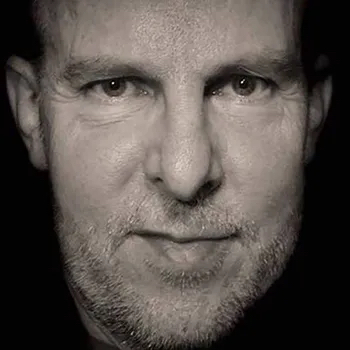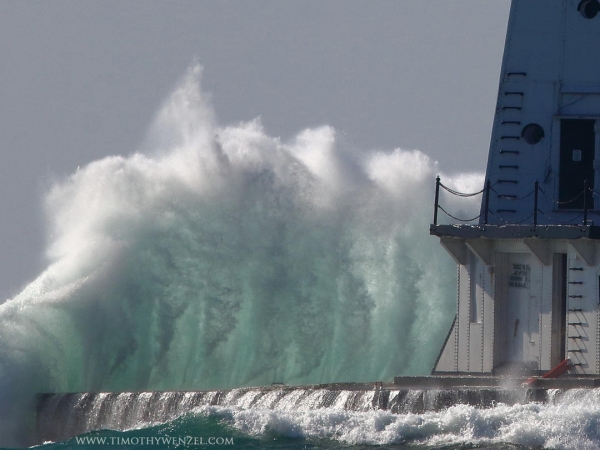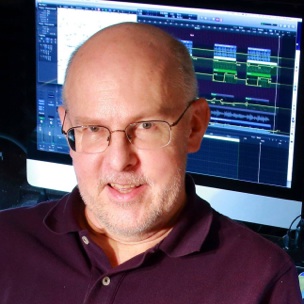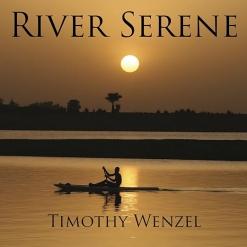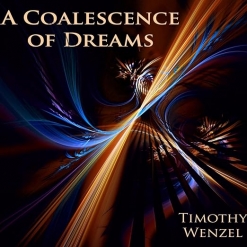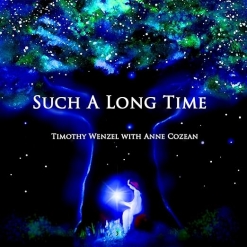One of the things I really love about working on MainlyPiano.com is the chance to hear a wide range of music, but even more, I love learning some of the many different ways that artists are inspired to create. I started reviewing Timothy Wenzel's music back in 2016 with his
Distant Horseman album and have reviewed five of his nine full-length albums to date. This is our first interview, and I have thoroughly enjoyed getting to know Tim better. I think you will, too!
KP: Hi Tim! I hope your 2024 is off to a great start!
TW: It is. I got the album out on time which is a lot of work, so that was a big relief!
KP: I can only imagine! You released your new album, Immerse, on January 1, and it is getting some really positive reviews, including mine. I assume it's doing well?
TW: Apparently. I am getting a lot of airplay and good commentary. It is climbing very high at Apple and Amazon streaming services, boosting overall streams to the highest I have ever seen. That is something every artist loves!
KP: That's great news! Am I correct that this is your tenth album?
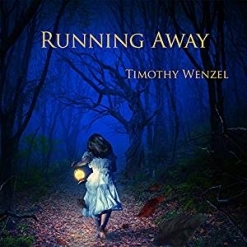
Click on album covers
to go to Kathy's reviews.
TW: Technically my 9th because one was an EP collaboration with a singer friend of mine. I often write lyrics for my songs so it was natural to want to deliver some of it to the public. However, we provided no publicity so sales were spotty. Mostly, the EP was just for fun and to stretch my creativity into the realm of words.
KP: What was the inspiration for Immerse?
TW: Lake Michigan. I was born and raised on its shores. It is home, but it can be terrifying and deadly too, especially while filming gales or walking out on ice when your brain is telling you "no, Tim, no." (I finally stopped doing that and instead turned to my drone to explore ice.) In fact the cover photo for the album is Lake Michigan, which I took while walking the beach for the last time with my brother, who later succumbed to cancer. So it is a very special photo for me.
KP: It's so beautiful and the colors are so intense! You have quite a few guest artists on the album, too. Tell us a bit about them.
TW: Long story. When I started putting out albums, it was just me and my synthesizers. However, I got some constructive comments from several people that in order to take my music to a new level, I should find a good engineer to master the albums. I asked around and found Corin Nelsen - what a find! He mastered my third album and every one since. In fact, I pronounced him producer of this last album - that is how brilliant he is.
With regard to musicians, I was also advised to bring in as many real acoustic instruments as is practical. Synths just cannot emulate the nuances of a good violinist for instance. So I made enquiries and met Josie Quick online in a music forum and she offered to play violin on my upcoming album,
Distant Horseman, in 2016. What a breakthrough that was! It is still my fav album.
Bill Binkelman coached me to get a real percussionist and, for me, that could only be the incredibly talented Jeff Haynes. His work has enhanced my sound enormously.
Corin also introduced me to Jill Haley so we asked her to play oboe and English horn on the last three albums. She did and that added much needed variety!
Next I needed a cellist, but no ordinary one, because I SO love cello. Jill Haley said, "Why don't you try my son, Graham Cullen?" Looking at his astounding accomplishments, fresh out of college, I figured he was the one. When Corin and I recorded him for the album
Dusk to Diamonds in 2021, we were utterly blown away. The sound, Kathy! The skill! At lunch break Corin and I just looked at each other and said "wow!"... but in more decisive language.
Also, for this last album, I put synthesizer electric guitar in two songs. During production, Corin told me he was recording guitar for David Cullen, Jill's husband and Graham's father. David brought an electric guitar so we asked him to try those two tracks. Success!! Not that a synth guitar is bad, it just is hard to add nuances, the upslide, the bend, etc.
Finally, for this last album, I contacted Josie's husband Tom Carleno, a very prolific and talented guitarist, to see if he would like to take a stab at playing the acoustic guitar parts. He eagerly agreed. My music is certainly not his style, but he did wonderfully - a testament to the depth of his skill! So, two entire families and one Jeff Haynes on the team!
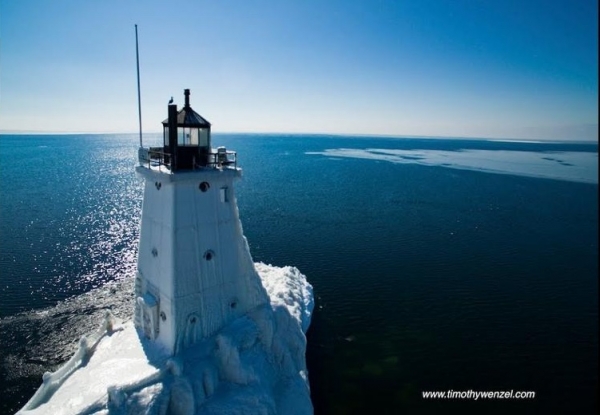
Lake Michigan
KP: They are all incredible artists!
So far, there are videos for two pieces on the album: "The Gale" and "Ice." Are both of the videos of the same lighthouse?
TW: Yes indeed. The lighthouse is located in Ludington, MI on Lake Michigan. I love going there and, in fact, my sister-in-law and nephew live there, so I go often.
KP: How did you manage to stay on your feet and keep the camera steady while filming for "The Gale"?
TW: I took some cues from previous attempts that failed. I now research the forecast in detail, especially the wind speed and direction and find a building or something to completely block the wind and sand using Google maps. I then pick the focal length of lens needed for that location and mount everything on an extremely sturdy tripod before I go. So it boils down to experience and planning.
KP: Makes sense! By comparison, the title track is very peaceful. I read that the cover artwork was photographed near where the video for "The Gale" was shot and the contrast is remarkable. From sub-zero ice to an almost tropical feeling shows just how changeable nature can be. Was it part of your intention for the album to illustrate that phenomenon via music?
TW: I have always been a weather geek and living among the Great Lakes, a fresh water sea in the prairie, provides many opportunities to observe nature at her finest. I love the outdoors, I love the Great Lakes, I love waves, sunsets, ice and everything Michigan has to offer. So yes, the "bipolar" nature of Lake Michigan is something that is both fascinating and inspiring.
KP: I can see that! What is the story behind "My Siren"?
TW: I think every musician wishes they could have been Ulysses, tied to the mast so he could hear the Sirens without being drowned. I have been fascinated by this since I was a kid. There is also another metaphor for the Siren that has to do with temptation and consequences. We all get tested by our personal Sirens, but most of us have learned to tie ourselves to the mast and never act on foolish dreams. We still hear the Sirens however. There is no way around that.
KP: Interesting! Tell us a bit about "Taliesin." Have you visited it?
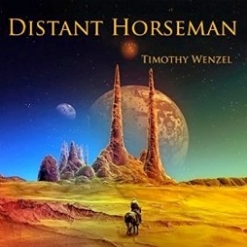
Click on album covers
to go to Kathy's reviews.
TW: No, but it is on my short list. I have long been fascinated with Frank Lloyd Wright's wonderful creations. I live just a train ride away from Chicago, so I have seen his house and many of his Prairie Home creations. It wasn't until I read a biography about Wright that I realized the significance of his beautiful home in Wisconsin. As you probably know, a madman who worked there brutally murdered his wife and two step children, and also another man, if I remember correctly. He then set fire to the home, which contained many of Wright's finest plans. Another worker risked his life by stuffing his arms with as many drawings as possible and fleeing with the madman on his heels. He survived, but Mr. Wright's psyche did not. He was never the same, as you might imagine. He moved to Los Angeles and experimented with concrete as a medium, but it never really took off. Poor man. How could anyone bear such a travesty? Hence the solemn nature of the song.
KP: I didn't know that story until recently and it is incredibly sad.
What inspired "A Man on the Run"?
TW: Loneliness and my time spent in Nebraska. I often simply left home in my old car and drove to isolated and desolate places, of which there are plenty. I usually spent part of the evening there, too, just watching strangers in these little towns. I listened to Elton John's "Goodbye Yellow Brick Road" all the time as well as The Moody Blues. I felt I was without a home and could never go back. Ok, these were tough times for an impressionable teenager - nuff said.
KP: Yes, but it's an important part of your story. Let's talk a bit about your background. Where were you born and where did you grow up?
TW: Born and raised in South Haven, Michigan - right on Lake Michigan. It is an historic tourist destination that used to cater to the population in Chicago. However, in 10th grade my family moved to Nebraska because my father had been transferred. I never adapted and left forever after high school.
KP: When did you start playing the piano and how long did you take piano lessons?
TW: I was five years old when I started playing the piano. My grandfather worked at the local piano factory and built a special one for my mom. My older brother took lessons and, in secret, I would touch the keys and feel the potential magic. When my brother became ill, my mom took me to the teacher in his place. I learned to play with reasonable skill, but I hated the classical piano I was forced to learn. At age 13, I threw away the books and played whatever came to me - often progressive rock and songs that I concocted.
KP: So music has always played a big part in your life?
TW: Yes. Church hymns, my mother's collection of classical albums and movie music all influenced me. Then came the days of cheap radios and the world opened up. Rock, jazz, folk and classical at the turn of a dial. I listened every night.
KP: Did you play in any bands as a kid or young adult?
TW: No. I only wanted to write music, not perform it in public.
KP: Are there any other musicians in your family?
TW: Yes, my mother was a very talented pianist, but no one else.
KP: Did you ever consider a career in music when you were growing up?
TW: Not really. I was so into nature and science that I knew I would be a scientist someday. And so it was. However, once I navigated the exhausting work of graduate school and beyond, I began playing electronic keyboards and crudely recording the songs that were coming out of me. Even still, I had little time to compose, given the nature of my work. Finally, I retired early, as was my plan, and began to write in earnest. My first album was released in 2012 and noted reviewer R.J. Lannan liked it and encouraged me to continue. So I did.
KP: When did you write your first piece of music?
TW: I wrote my first song for a recital at age 5. As an aside, when I was cleaning out my mother's estate a few years ago, I arranged for an earnest buyer with young children to buy the piano for practically nothing. As I sat down to play it for the last time, I just happened to open the top of the bench and guess what I found. My original sheet music for that song, laying right on top of the other things! It was surreal! I felt my mom must have put it there for me to find someday - and I finally did.
KP: What an amazing find! Do you play any instruments other than the piano and keyboards?
TW: Guitar and flute but not well.
KP: Where did you go to college? Degrees?
TW: BS in chemistry at the University of Missouri St. Louis, graduate school in physical organic chemistry at Cornell and then I broadened my expertise by becoming a postdoctoral associate with a famous professor at U. California, Berkeley who worked in a very different field.
KP: When were you at UC Berkeley? That's near where I grew up.
TW: Really! That is great! I was there 2003 to 2005. Kathy, I felt that was the culmination of my education. I SO loved UC Berkeley and I thrived as an independent researcher. The entire world seemed to open up for me.
KP: I grew up in Oakland, CA and the mother of one of my best friends worked at UC, so we jumped on the bus and went out there often. I loved all of the bookstores and record stores and spent a lot of my allowance and babysitting money there! The atmosphere of the campus area was so alive - especially in the late 60s and early 70s! I just loved being out there!
TW: UC Berkeley is where I started doing serious composing. I would take an hour break every few days and sign up for a piano room at the Music Department. I brought a little tape recorder to help me remember what I was spontaneously creating.
KP: I know you had a career as a research scientist. What did you research?
TW: It is complicated to explain, but I became an expert in the catalysis of chemical reactions. Catalysts are molecules or substances that can greatly enhance the rate and selectivity of important chemical reactions, but they do their work without being destroyed. A co-worker and I hit a home run at Dow Chemical by inventing something called Chain Shuttling Catalysis, which enabled a renovation in polyethylene research, something that had remained stagnant for decades. We got a lot of attention and I gave lectures around the world.
KP: Interesting! Did you compose music during that time?
TW: Yes. Starting a real job enabled me to have more free time, so I bought electronic keyboards as they evolved and recorded what I played. My writing accelerated when I joined the internet group iCompositions. I made many friends that I still know today and I started to blossom as a writer. I collaborated with singers on the site also, giving me the opportunity to write lyrics and broaden my creative spirit.
KP: I've read that the tragic passing of your brother had a huge influence on your changing careers from science to music. Do you want to elaborate on that a bit?
TW: That was a big tragedy for me. I took a leave of absence at work and traveled to a number of cancer centers with my brother, but in the end, there was little they could do. He finally participated in a clinical trial in Chicago, but it resulted in an untimely death after a few weeks. I was exhausted and his passing brought on an attack of bradycardia for which I was hospitalized. I was so freaked out that I refused to sleep in the bed and instead opted for the visitor couch and did nothing but listen to music to escape. Finally, my personal doctor got me released because he knew that death of a family member can bring on heart problems and what I needed was counseling. However, that did not help my depression. It was music that saved me. I realized that music was the true language of my innermost soul and writing it was supremely cathartic. At that juncture, I opted to retire early, having attained a high position in Dow R&D that guaranteed me a good pension. That is when I began writing in earnest, producing my first two albums in 2012.
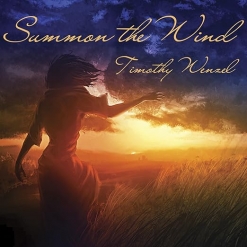
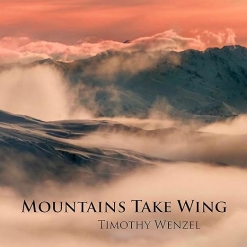
KP: I'm so sorry you had to go through all of that!
Who and what do you consider to be some of your musical influences?
TW: So many genres have influenced me such as classical, rock, progressive rock and New Age. I thought Enya, Clannad, George Winston, Liz Story, Will Ackerman and others were finally making music closer to my heart. However, I was still trying to find something special and that came from within. I am not egotistical about my music, but to tell the truth, I write for myself, to explore my spirit, express my passions and tell my story. If others like it, that is wonderful. Sharing my work with those who like the style and message has been so rewarding. When someone tells you that your music came to them at a critical juncture in their lives and helped them survive, you feel that you are indeed helping to make a better world.
KP: That has to be an amazing experience!
You have received a number of awards for your music. Tell us about them.
TW: At first I explored music awards and did well but I decided it was the wrong way to start. I simply had to go out on my own as an independent artist and test the waters. The Zone Music Reporter has placed several of my recent albums at #1 for any given month and nominated one for a yearly award. That said, I am now pursuing music for film as a second goal. I have won a number of awards for both my films and my music. We'll see if that leads to anything.
KP: Good luck! Is there a particular philosophy that you try to express in your music?
TW: That music is the language of your soul. Words do not suffice. Listen closely or write with awareness and you intuit much.
KP: What's up next for you?
TW: I have enough songs written for another album at this point, so I would need to critically arrange them and evaluate anew. Likely a tenth album is in the offing. Writing or using existing songs for film might become a reality if I learn how to better connect with filmmakers.
KP: If you could have any three wishes, what would they be?
TW: 1) Wellness for my family
2) To learn how to share my music better with those who might like it and
3) To eliminate war and other violent acts from the human psyche - gotta think big on that third wish, don't we?
KP: Absolutely! Is there anything else you'd like to "talk" about?
TW: Yes, I would like to add that reviewers such as yourself are invaluable mirrors for we artists. As artists, we need to take criticism and suggestions from others with the utmost seriousness if we wish to grow. I know this from personal experience.
Many thanks to Timothy Wenzel for taking the time for this interview! For more information about Tim and his music, be sure to visit
his website and his
Artist Page here on MainlyPiano.com.
Kathy Parsons
January 2024

